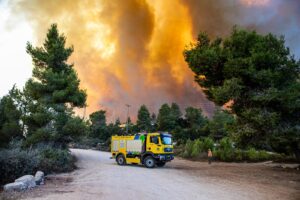
(Press Release) Keren Kayemeth LeIsrael-Jewish National Fund (KKL-JNF) is a non-governmental organization (NGO) that operates as the National Forest Service in Israel. Established over 120 years ago, KKL-JNF is considered one of the world’s oldest organizations operating in the field of environmental solutions, forestry and fire protection.
As part of the COP27 climate conference being held in Sharm el-Sheikh, Egypt, KKL – JNF announced on Friday two new projects: a nationwide plan for buffer zones for fire protection, and a plan for the restoration of the burned forest in the Jerusalem mountains. KKL-JNF’s chief forester, Dr. Gilad Ostrovsky, held a lecture at a U.N. side event at the conference where he revealed the two programs.
The fire protection program announced will include a nationwide mapping of buffer zones around settlements, and forested buffer zones will be carried out. The plan will contain a fire protection plan for each forest that will include planning designated areas for fire protection, ways to move forces, water filling points and more. In addition, dedicated forestry treatments will be carried out to contain fires such as thinning, pruning, treatment of lying wood materials, changing the composition of species, irrigation and more.
The plan for the restoration of the Jerusalem mountains, also announced by KKL-JNF at COP27, will include treatment of the damaged forest areas and actions to rehabilitate the forest. The plan to restore the land in the Jerusalem mountains will first include immediate action to eliminate hazards for the safety of travelers in the forest areas. In the second phase, action will be taken to treat the damaged forest areas proportionately, with an ecological vision that ensures the preservation of the soil as well as the recovery of the grassy and stunted vegetation in the best possible way. Finally, operations will be carried out to renew the forest.
Ostrovsky said, “The climate change crisis led us to focus on fire prevention and forest restoration as primary goals. Our management method is based on smart intervention and we conduct ecological surveys in order to protect natural assets in the forest.”
*
Preceding provided by KKL-JNF